Gen. Eisenhower's grandson educates tour group for D-Day anniversary | Georgiana Vines
- Oops!Something went wrong.Please try again later.
- Oops!Something went wrong.Please try again later.
David Eisenhower, grandson of Gen. Dwight D. Eisenhower, Supreme Commander of the Allied Expeditionary Force in Europe during World War II, says Americans went to Normandy, France, 80 years ago to help liberate the French from the Nazis because they understood what a free country means.
There are times and situations where people make sacrifices to show they have respect for human values and dignity, he said.
Eisenhower spoke on June 4 at Normandy American Cemetery and Memorial at Colleville-sur-Mer, France, where thousands of American soldiers are buried, in a special ceremony at a pole where an American flag flies. It was included in a two-week trip to Celtic lands and the 80th anniversary of D-Day and the Battle of Normandy that I took, with veterans in the group joining Eisenhower to place a wreath at the flagpole during the ceremony.
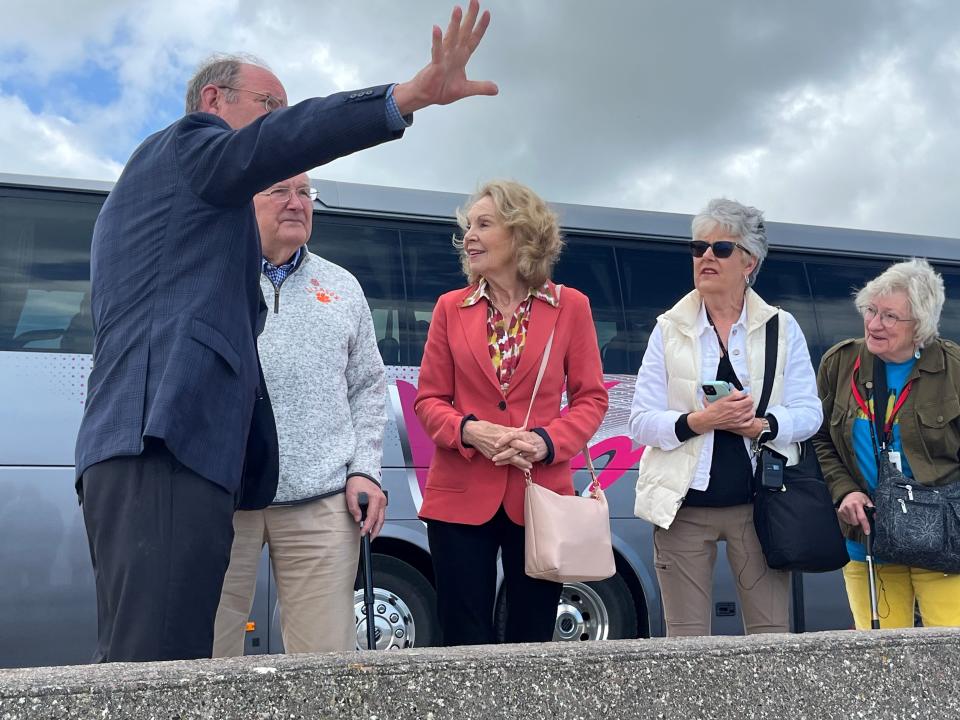
Eisenhower and his wife, Julie Nixon Eisenhower, were guests of Gohagan and Company, a travel agency in Chicago, that arranged the trip.
The ceremony at the flagpole was a substitute for another spot at the cemetery that became unavailable as preparations were made for the actual celebration of D-Day on June 6. Some of the five landing areas of the Allied Forces in 1944 also were closed to all but locals and dignitaries like U.S. President Joe Biden, King Charles III of the United Kingdom, French President Emmanuel Macron, and their wives. But the small villages in both Normandy and parts of England had activities before and after the official D-Day celebration that brought tourists to the area. Many American flags were flying throughout the communities during our visit.
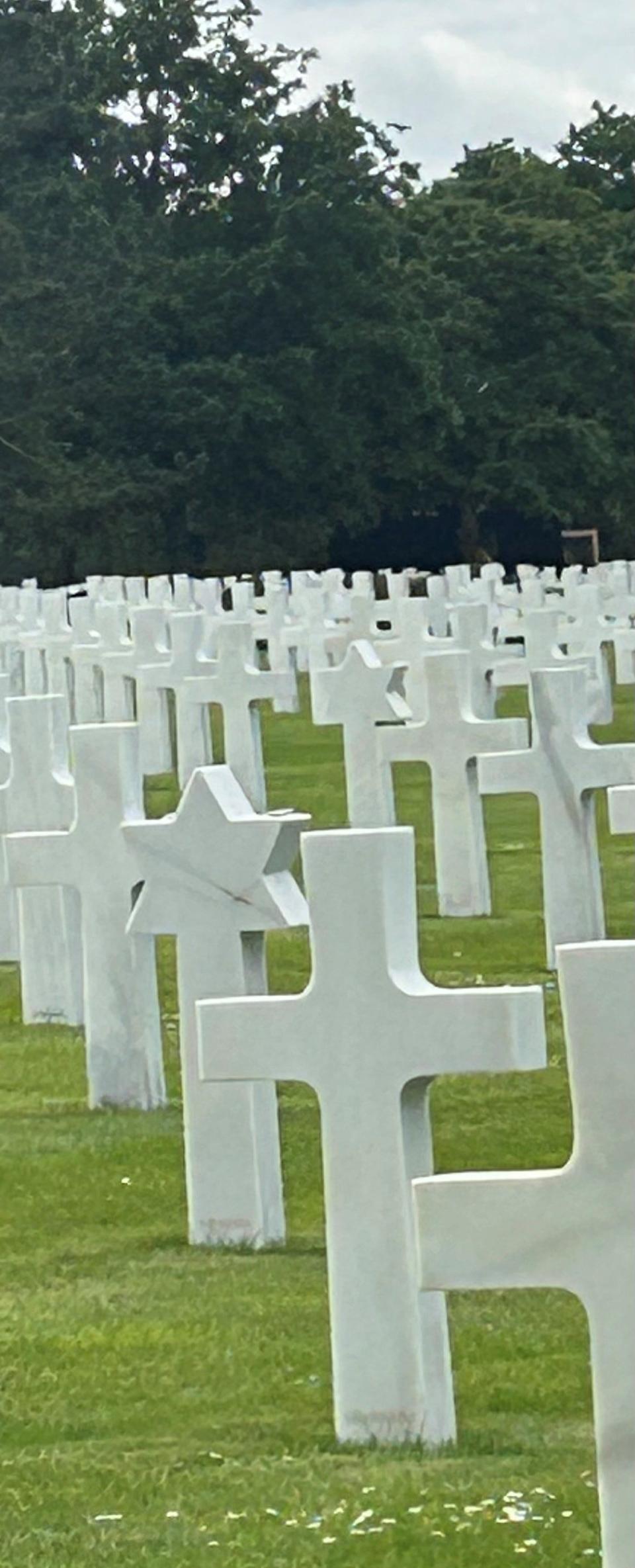
At the June 4 ceremony, we sang the U.S. national anthem; as part of his talk, Eisenhower read names of our group’s family members who had participated in D-Day; and then we had a moment of silence at the end. Many tears were shed as we stood near the white marble crosses and Stars of David above the graves.
Clyde Maxwell, a retired veteran who assisted Eisenhower in placing the wreath, said this: “A very moving experience. I sincerely regret that most of our young people today have no appreciation for the sacrifices these young men, some as young as 16, made for our country so that we might enjoy the many freedoms we have today.” Maxwell, an 83-year-old retired lieutenant colonel of the U.S. Army Medical Service Corps, lives in Rabun Gap, Georgia.
Dwight David Eisenhower II is more than the 76-year-old grandson of the late general. The grandfather, who died in 1969 at age 78, also was the U.S. president in 1953-61 but preferred to be remembered for his wartime service. The younger Eisenhower, for whom the U.S. presidential retreat Camp David in Maryland is named, has taken advantage of his place in history and become a noted historian of World War II and the Cold War.
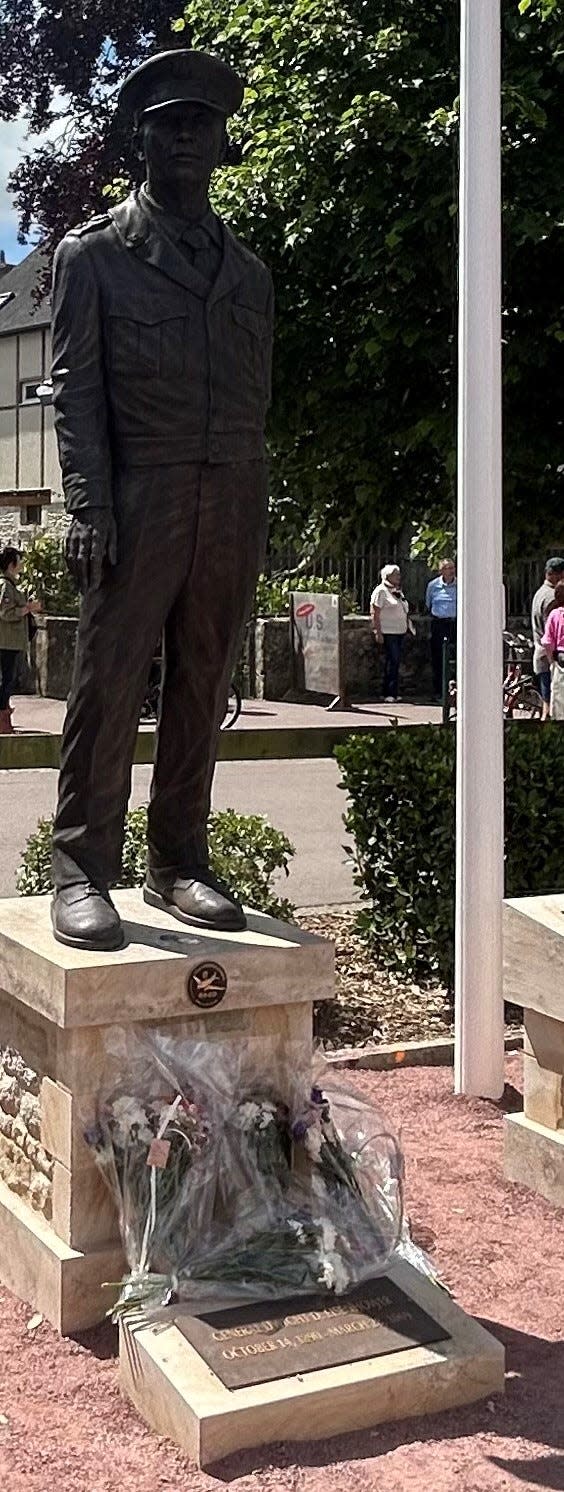
His 1986 bestseller, “Eisenhower at War 1943-1945,” was a finalist for the Pulitzer Prize in history. He is a public policy fellow at the Annenberg School for Communication and Journalism at the University of Southern California and the School of Arts and Sciences at the University of Pennsylvania. A book recommended for our trip was “Going Home to Glory: A Memoir of Life with Dwight D. Eisenhower, 1961-1969,” written by the grandson with his wife, the daughter of the late President Richard Nixon.
The Eisenhowers joined the tour sponsored by Gohagan as we cruised on Le Dumont d’Urville, a French cruise line owned by Ponant, and David Eisenhower gave a lecture, “Triumph and Tragedy,” on a day we were at sea. Once we got to the Normandy region, our group was spread out on six buses, with the Eisenhowers eventually joining each bus to answer questions and make comments about the area.
The couple was very approachable. On the day the tour went to Omaha Beach to walk the shore or along a sidewalk that took us to German bunkers left as their own monuments, Susan Crabtree of Knoxville, my roommate on the trip, and I came upon David and Julie Eisenhower talking to some of our travel companions on the sidewalk. They graciously agreed to be photographed by all who made the request.
When we arrived at Omaha Beach, the tide was high. David Eisenhower observed while we were being photographed, “The tide has already gone out several hundred yards since we arrived.” The tide was a factor when the troops landed on the beaches 80 years ago.
David Eisenhower’s talk aboard the ship was about his grandfather’s key role in the success of the Normandy invasion as well as issues that were unsettled after World War II and others that arose that influenced future presidential campaigns. He described his grandfather’s planning and supervision of the Normandy campaign as methodical and said he was a man of great determination. The five-star general, nicknamed “Ike,” is a revered figure in France and England.
A new statue of Gen. Eisenhower was dedicated in the town of Sainte-Mère-Église the day before we visited on June 4, our local guide told us. Flowers arrangements were at the base of the statue in a show of appreciation. On the day we visited the town, the streets were full of people, some in uniform for reenactments, while others were driving period jeeps. Street vendors abounded and pubs were busy.
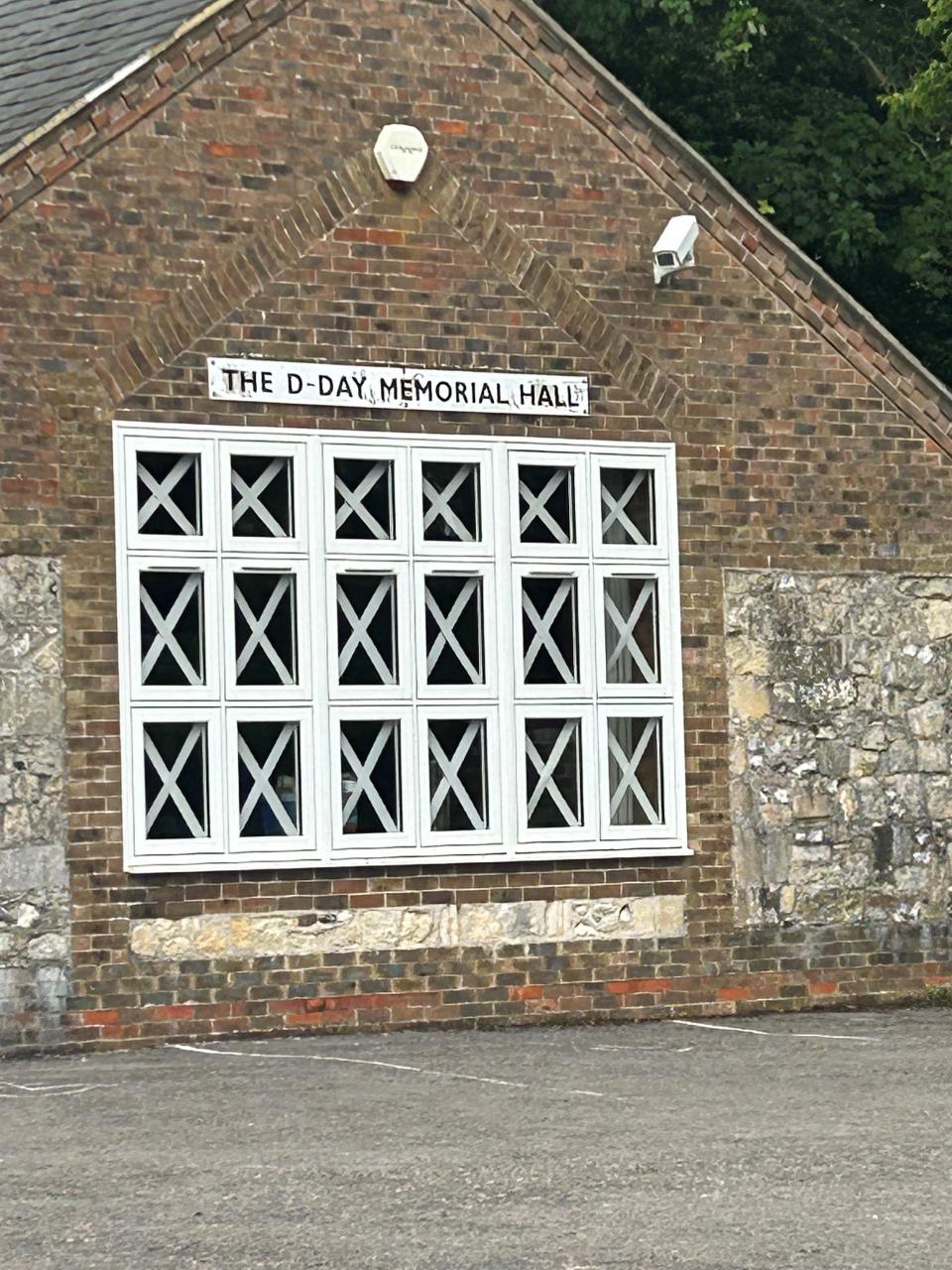
Then in England on June 6, a visit was made to the village of Southwick, which became the forward base of the high command in the Supreme Headquarters Allied Expeditionary Force. Eisenhower was known to quaff the local ale at the Golden Lion Pub, which is still in business. Other commanders there when decisions were made about the Normandy invasion were British Field Marshal Bernard Law “Monty” Montgomery and British naval officer Bertram Home Ramsay.

The village was preparing for post-June 6 activities, including taping X’s on windows as the English people did during World War II to keep the glass from shattering if bombs hit.
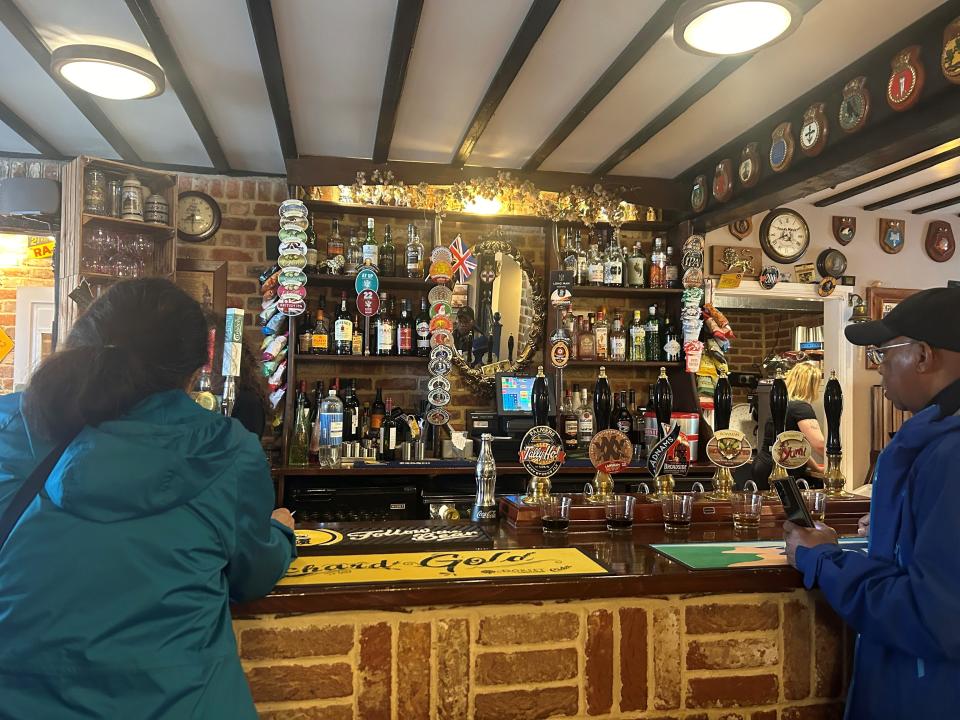
On the ship, Eisenhower was not the only speaker, with other talks on Anglo-American relations, immigration and ethnicity, and 19th-century American history. Ken Gormley, president and professor of law at Duquesne University in Pittsburgh, Pennsylvania, discussed President Eisenhower’s challenges with McCarthyism, the Little Rock Crisis and America’s conflict over civil rights. As president, Eisenhower’s approach was “the middle way,” or even a “quiet way,” which he considered more effective, Gormley said. He is considered an authority on American presidents and the U.S. Constitution.
Another speaker was Allen Packwood, director of the Sir Winston Churchill Archives Centre at Churchill College, University of Cambridge. He discussed the complexity of the Normandy invasion and Churchill’s leadership at a time when the British prime minister “didn’t want to fight in France. He wanted to defend Britain,” he said.
Packwood was in Knoxville in 2006 as part of a program on Churchill sponsored by the now University of Tennessee’s Howard H. Baker Jr. School of Public Policy and Public Affairs. Packwood will return to Knoxville in July to speak at a program on World War II sponsored by the East Tennessee Historical Society. The society’s CEO, Warren Dockter, is a former research fellow at Clare Hall at Cambridge and said he considers Packwood “a mentor.”
Georgiana Vines is retired News Sentinel associate editor. She may be reached at gvpolitics@hotmail.com.
This article originally appeared on Knoxville News Sentinel: Gen. Eisenhower's grandson educates tour group for D-Day anniversary

